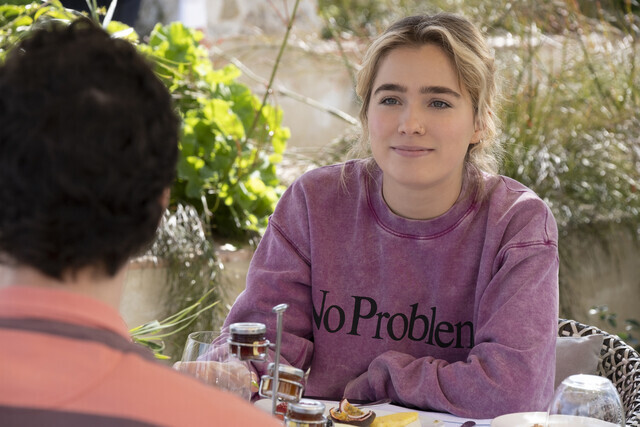
The first season of “The White Lotus” was a critical and commercial success for HBO and Mike White, landing a stunning ten Emmy wins and widespread acclaim. It’s a tough act to follow, and the second adventure for a show that will move locations and (most of its) cast every season will likely struggle to escape the shadow of the first. At first, it feels thinner, its themes more diffused among a more sprawling cast that's more literally spread out than the confined comedy of errors of year one. It’s also just not quite as funny as White settles into a tone that’s more inquisitive of gender roles and the sexual games people play than his interrogation of irresponsible wealth in year one. I felt like the first season was about how wealth insulates against actual repercussions and allows privileged people to brush off one day’s major trauma with the next day’s opulence. The new season, which has not been sent in its entirety to press, is more thematically adrift, although there’s every reason to believe White will tie his various threads together by its conclusion. And the truth is that even if the themes are taking longer to lock into focus on this journey, the dialogue and characters are so sharply written that the flaws can be easily forgiven. Mike White is a writer that is as thrilled with a fascinating dinner conversation as he is a murder mystery, and so even as the plotting sags more than it did the first time, the way that his characters bounce off each other, unpacking their social constructs, remains fascinating.

The location for this season of “The White Lotus” is the gorgeous landscape of Sicily with its rolling hills and beautiful beaches. And, of course, an unidentified dead body to open the season, giving the whole thing a mystery element that hangs in the background.
Once again, we get to know the manager of the establishment, the hard-working Valentin (Sabrina Impacciatore), but White smartly shifts a bit from the classic “Upstairs, Downstairs” dynamic of the last season, showing how power dynamics can be at play in locations like this even when no hotel employees are involved. For example, Portia (the excellent Haley Lu Richardson) has been forced by her boss Tanya (Jennifer Coolidge, reprising her Emmy-winning role) to join her on the trip, even though she has to hide from Tanya’s husband Greg (Jon Gries, the only other returnee from last year).
Told to go away but not far enough away that Tanya can’t get her if she needs her, Portia meets a sweet American named Albie (Adam DiMarco), who has traveled to the region with his father Dominic (Michael Imperioli) and grandfather Bert (F. Murray Abraham). Dominic’s wife was supposed to be on the trip too, but he was recently caught cheating (again) and has chosen to indulge in that character flaw again with the gorgeous Lucia (Simona Tabasco), who works the hotel’s richer clientele with her friend Mia (Beatrice Grannò), who longs to leave it behind and be a professional singer.

Finally, there’s a quartet through which I believe White wants us to view most of the season’s themes. A successful alpha male named Cameron (Theo James) has invited his college roommate Ethan (Will Sharpe) on the trip, and both gents have brought their partners. To the judgmental Harper (Aubrey Plaza), Cameron and his wife Daphne (Meghann Fahy) seem to be just awful people, but she’s almost fascinated by what seems like emotional stability and genuine happiness. We like to think that rich and powerful people must be miserable on the inside, but what if they’re just oblivious enough to their awfulness to be perpetually happy? “We’re all entertaining each other as the world burns,” says Harper, but White seems to be unpacking how there are certain people in this world who can’t even smell the smoke.
While there’s undeniable richness in these characters, some of the themes of the first half of season two of “The White Lotus” are a little underdeveloped. As with any show like this, people will be drawn to certain characters more than others. I’m a little weary of Tanya already, although it makes perfect sense that her insulated ignorance of the way she impacts other people would be the throughline between seasons. I much prefer spending time with Plaza’s crisis of character and Richardson’s completely genuine performance. She really grounds a show that threatens to spiral into satire at times.
Despite some inconsistency, there’s joy to be had in spending time with so many three-dimensional characters given piercing dialogue in a beautiful setting. I feel like there’s less under the surface if one scratches at the beauty than there used to be or arguably should be given how much praise is levied at the writing on this program, but, again, it’s the kind of thing that could come together in the final episodes not sent to press. And the trip might even be worth it if it doesn’t.
Four episodes screened for review. Premieres on HBO on October 30th.
Brian Tallerico is the Managing Editor of RogerEbert.com, and also covers television, film, Blu-ray, and video games. He is also a writer for Vulture, The Playlist, The New York Times, and GQ, and the President of the Chicago Film Critics Association.





